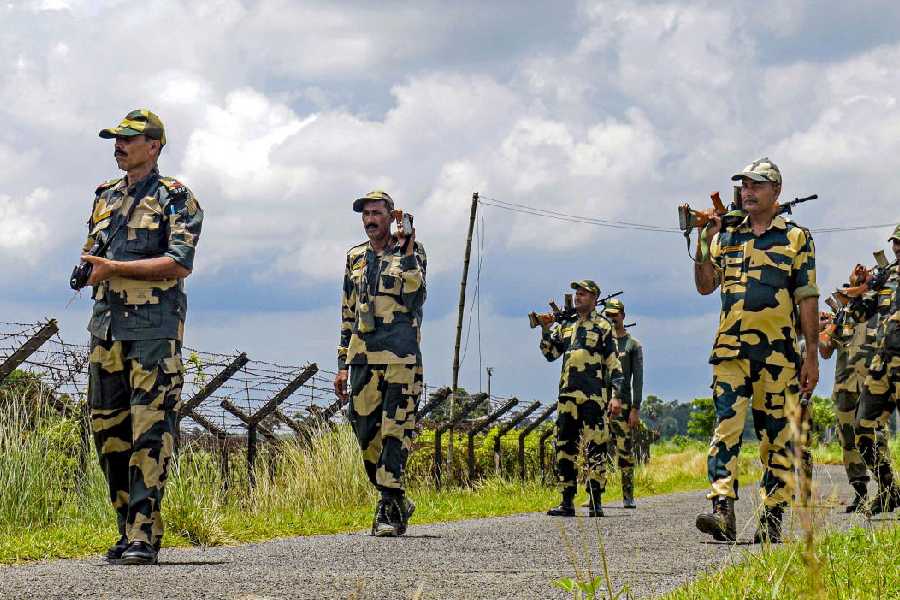A Bengal-based human rights organisation, Manabadhikar Suraksha Mancha (MASUM), has appealed to the National Human Rights Commission (NHRC) to intervene and prevent Border Security Force (BSF) personnel from being posted 8km inside villages from the international border.
The organisation claimed such deployments result in unnecessary interference in the daily lives of residents and their livelihood.
In its petition to the NHRC, with copies sent to the director general of the BSF, the Union ministry of home affairs, and the Bengal police, apart from others, MASUM highlighted a recent incident of alleged “brutal assault” in Murshidabad’s Jalangi area to stress their point.
On November 8, a young fisherman, Anowar Mondal, was reportedly beaten mercilessly by a BSF company commander while fishing near Toltoli ferry ghat. The officer allegedly confiscated and damaged Mondal’s identity card, issued by the Bengal government, rendering it unusable. Senior BSF officials of the South Bengal Frontier, however, refuted the allegations claiming it was “far from truth”.
However, according to the petition, Mondal, a 20-year-old resident of Char-Parashpur village under Ghospara Gram Panchayat, was fishing with others around 6am when the incident occurred. The BSF commander, identified as Shibram from Battalion-46 (Forajipara border outpost), allegedly abused him verbally before assaulting him with a ruler, warning him not to return to the area for fishing.
“This incident not only caused significant physical harm to the young fisherman but also jeopardised his livelihood, instilling fear within his community,” said MASUM secretary Kirity Roy.
Mondal lives in Char-Parashpur, an alluvial stretch of land formed on the other side of the Padma river after his original village was lost to erosion. The villagers, dependent on fishing for their livelihood, rely on BSF clearance to access these areas as they lack the know-how of border demarcations in rivers.
To prevent their harassment, the state government has issued identity cards to these fishermen.
However, Roy alleged that “high-handedness” by BSF personnel has made the villagers live in constant fear.
“The actions of the BSF violate fundamental human rights and constitutional protections, including those ensured under the provisions Article 21 (right to life and personal liberty), Article 19 (freedom of profession), and Article 22 (protection against arbitrary arrest and detention),” he said.
Mondal sought medical treatment at a local hospital and later filed a general diary with the Jalangi police station, which the cops had initially refused. However, no action has been taken by the police.
Contacted, Domkal SDPO Shubham Bajaj claimed ignorance about the incident and promised to look into the matter, including an alleged refusal by Jalangi police to register a complaint initially.
A MASUM fact-finding team visited the area to speak to Mondal and other villagers, who reported widespread fear of the BSF.
Refuting the allegations, BSF South Bengal Frontier DIG Nilotpal Pandey said: “Anowar was observed at night crossing beyond the domination line in the riverine, which is an unfenced stretch of the border. Being familiar with the terrain as a regular visitor, he is well aware of the protocols. BSF personnel maintain an entry point for villagers who frequently access the area, but some individuals attempt to bypass it. Typically, no one ventures into such stretches at night unless driven by illegal intentions. A day before the incident, Anowar Mondal was also spotted beyond the domination line under suspicious circumstances, prompting our personnel to impose restrictions on his movement due to repeated violations.”
“However, his allegations of assault are baseless and can be verified through independent sources,” Pandey said, adding that allegations of damaging his identity card would be looked into.
The incident has reignited debates over the Centre’s decision to extend the BSF’s jurisdiction to a 50km-radius from international border in states like Bengal, Assam, Punjab, Gujarat and Rajasthan.
The Centre called it necessary to curb smuggling and enhance border security.
However, Bengal chief minister Mamata Banerjee and her Trinamool Congress government called it a “direct attack on the federal structure” and an encroachment on state powers. The TMC has also alleged that the move is “politically motivated” and aimed at undermining regional governments opposed to the BJP by creating “parallel power structures”.
As a mark of protest in 2021, the Bengal Assembly passed a resolution demanding the revocation of the jurisdiction extension. TMC leaders have raised concerns about harassment of locals and the creation of an atmosphere of fear in border districts, further fueling the controversy over the balance of power between state and central authorities.
In January this year, the Supreme Court announced that it would examine the validity of Centre’s 2021 notification to undertake searches, seizures and arrests within the extended 50km stretch compared to earlier limit of 15km.
Trinamool Congress MP from Murshidabad Abu Taher Khan told The Telegraph: “As an MP I daily encounter several complaints of BSF atrocities from people who live in five Assembly segments in my constituency that are near the India-Bangladesh border. BSF personnel have unleashed terror in the bordering villages in these segments. If they in real terms allowed access up to 50km, normal lives of people would be paralysed in fear.”
Senior BSF officials, however, claimed that the central forces prioritised fostering positive relationships with communities near the border.
“We firmly believe that a strong rapport between the locals (local residents) and security forces is essentialto effective border security. Our personnel are well-trained and fully aware of their rights and responsibilities, leaving little room for human rights violations,” said a senior BSF official.

